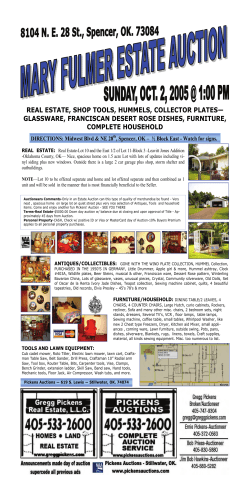
Lawn Conversion Workshop Presentations - the Public Works
Lawn Conversion Lawn Conversion • Introduction • Drought & City Water Supply • Mandatory Water Waste Restrictions • Lawn Conversion • Questions California Drought • September 2: City Council calls Stage 3 water shortage, enacts water restrictions • Water Board Emergency regulations: 28% reduction – June 2015—February 2016 compared to 2013 • Jan-Feb 2015: SF residential reduced water use 23% Mandatory Water Waste Restrictions • Outdoor watering only 3 days a week: – Odd numbered addresses: Tuesday, Thursday and Saturday – Even numbered addresses: Wednesday, Friday and Sunday – No outdoor watering on Monday • No watering between 9am – 6pm – Hose with a shut off nozzle OK – Handheld container OK • No watering in the rain Mandatory Water Waste Restrictions • No excessive water flow or runoff onto pavement, gutters or ditches from irrigation • No washing off paved surfaces unless necessary for sanitation or safety – – – – Hand held bucket Hose with shut-off nozzle Cleaning machine that recycles water Low volume/high pressure water broom • Property owners must fix leaks immediately or within 72 hours of notification by the City. • Fountains and water features must have recirculating water SaveDavisWater.org Jennifer Gilbert Conservation Coordinator (530) 757-5688 JGilbert@CityofDavis.org LAWN CONVERSION City of Davis Wednesday Water Workshop May 20, 2015 presented by Kerry Daane Loux City of Davis Park Planner Community Services Department, Parks Division LEED AP, California Landscape Architect #2039 LAWN CONVERSION • • • • • Introduction Why consider lawn removal? Project planning – Say so long to lawn! Techniques and Tips Design ideas and sources for drought tolerant, eco-friendly and low maintenance options INTRODUCTION 28% Mandatory Water Restrictions Maximum 3 days/week Irrigation http://stopwaste.org Many Resources are available at the library, on-line. The New American Front Yard is a visionary design manual, and a practical do-it-yourself guidebook for front yard transformation. by Sarah Carolyn Sutton: http://kissyourgrassgoodbye.com/ East Bay MUD Resource book http://www.ebmud.com BAY-FRIENDLY LANDSCAPING http://www.bayfriendlycoalition.org/LYL.shtml Yes to Good Uses for Lawn Areas! City of Davis website Community Spaces Creeping Red Fescue: http://www.stoverseed.com Active Recreation No-mow or low-mow alternatives with appropriate lawn maintenance options http://www.bayfriendlycoalition.org But maybe not needed here. WHY REMOVE YOUR LAWN? Beauty & the new landscape aesthetic. Sustainability & environmental beliefs. • Water use reduction & drought tolerance. • Energy conservation & avoiding chemicals. • Low maintenance, cost effective and minimal resource use (zero waste) gardening. • Introduce natives, grasses & wildflowers. • Provide food, flowers & healthy living options Habitat enhancement & beneficial insects. http://www.bayfriendlycoalition.org Beauty & the New Landscape Aesthetic The American Front Yard by Sarah Carolyn Sutton: http://kissyourgrassgoodbye.com …embracing new styles, shapes and color in our residential landscapes Sustainability & Environmental Beliefs • • • • • • Make a climate change difference in your garden! Green Gardening avoids chemicals such as herbicides, pesticides, excessive fertilizers. Reduce lawn-based energy consumption and conserve resources typically used for maintenance based on mowing, watering and fertilizing. Build healthy soil by adding compost and mulch. Reduce ‘monoculture’ planting. Support eco-friendly landscapes & management. Sustainable and eco-friendly looks great! http://stopwaste.org Drought tolerant plantings offer variety http://stopwaste.org Landscape mulch reduces maintenance, decreases water use and is cost effective Lawn removal creates the opportunity to introduce natives, grasses, wildflowers http://saveourwater.com …and to provide growing spaces for fruits and vegetables, cutting flowers and opportunities for healthy living. Habitat Enhancement For the good of the earth, humans and other living creatures! PROJECT PLANNING Now that you’re convinced, what are the steps to saying so long to your lawn? • • • • • Create your master plan—DIY or designer? Think about preference, design style Factor in schedule, budget, phasing Address your turf removal approach Consider tree watering, maintenance needs Project planning books & on-line resources TECHNIQUES AND TIPS A number of approaches to lawn removal are available and can be used in combination or alone: 1. Sheet mulching—suppress weeds and build fertile soil with ‘lasagne method’. 2. Sod cutting 3. Deprive turf – water, light, etc. 4. Herbicide use for difficult to remove grasses such as bermuda, heavy weeds http://publicgarden.ucdavis.edu/staceys-lawn-removal #1. Sheet mulching with cardboard, newspaper, bulk mulch like straw, soil Advantages of Sheet Mulching • Pros of sheet mulching over bin composting: finished compost is in place in planting bed • Effectively suppresses weeds due to thickness of layers and solid cover eliminating air & light • No need to treat or remove existing lawn • Follows permaculture principles & techniques • Creates rich, fertile soil ready for planting— either immediately or after 3 to 6 months Materials And Methods • Sheet Mulch: 1. Cardboard is most common; available from moving companies, appliance or bike shops. Overlap pieces; remove non-compostable tape. 2. Newspapers, 100% cotton sheets or blankets, wool carpet can also be used. • Soil, amendments, weed free garden trimmings, straw, manure, compost: 1. Optional and as needed for depth and grades • Top mulch layer: 1. Shredded bark, leaves, straw • Water: Moist, but not wet. Tools and Timing • Gloves, scissors, digging forks, wheelbarrow, etc.: 1. Tools to move cardboard, soil and/or top mulch 2. Stakes to hold components in place if necessary • Seasons and Steps: 1. 2. 3. 4. Ideally, sheet mulching will be completed in the spring prior to dry season, and be ‘watered in’ with minimal spray during summer season Planting can wait until the fall when seasonal rains will support new plant growth. Gather all tools and materials prior to starting First water area to be mulched, then lay down overlapping cardboard, cover with soil and/or mulch. The deeper the ‘lasagne’ layers, the better the compost/soil decomposition, richness, fertility. Continue to keep area moist. http://publicgarden.ucdavis.edu/staceys- lawn-removal •Before you start, order mulch, obtain cardboard, other materials • Measure the lawn area you’re removing, i.e. for a 10’ x 20’= 200 s.f. This is how much cardboard is needed. • For the soil and mulch, etc. multiply by the depth of mulch in feet to get cubic feet (i.e. 6”=0.5’ x 200 = 100 cu ft. • Divide by 27 to get cubic yards (3.7 cu yds), and round up to the nearest yard = 4 cubic yards of mulch to order. Kerry Daane Loux: Lafayette residence sheet mulching Now you’re ready to put the plan in action. Lay out the cardboard over the existing area. http://publicgarden.ucdavis.edu/staceys-lawn-removal You can cover the cardboard with soil, or mulch or both. Once you’re done you can leave the area mulched only for the summer and wait to plant in the fall to save even more water. Kerry Daane Loux: Lafayette residence sheet mulching http://publicgarden.ucdavis.edu/staceys-lawn-removal Or you can go ahead and plant your water conserving landscape. Kerry Daane Loux: Lafayette residence sheet mulching #2. Another technique is to rent a sod cutter to get rid of the lawn. This can be done on its own or as part of your sheet mulching approach. http://arboretum.ucdavis.edu #3, 4. In some cases, a more drastic measure such as soil solarization, cutting off water or applying herbicide is needed for bermuda grass, heavy weeds http://arboretum.ucdavis.edu UC Davis prepared this La Rue median for native plants and grasses with herbicide. http://arboretum.ucdavis.edu The lawn area median on La Rue is visually improved in both landscape planting and wildflower sections La Rue Avenue Wildflower Explosion! http://arboretum.ucdavis.edu Design Ideas and Sources http://saveourwater.com Plant Color and Texture http://kissyourgrassgoodbye.com Private & public nooks and seating areas http://saveourwater.com Engaging Entryways http://cesacramento.ucdavis.edu Layered planting and accents http://kissyourgrassgoodbye.com Permeable Pathways & Paving Design Style The American Front Yard by Sarah Carolyn Sutton: http://kissyourgrassgoodbye.com The American Front Yard by Sarah Carolyn Sutton: http://kissyourgrassgoodbye.com Walls, steps, fences, entry accents The American Front Yard by Sarah Carolyn Sutton: http://kissyourgrassgoodbye.com Permeable Paving Options https://www.ebmud.com/waterand-wastewater/water-conservation The American Front Yard by Sarah Carolyn Sutton: http://kissyourgrassgoodbye.com https://www.ebmud.com/waterand-wastewater/water-conservation The American Front Yard by Sarah Carolyn Sutton: http://kissyourgrassgoodbye.com Accents and Art www.ebmud.com/water-and-wastewater/water-conservation/lawn-goodbye-landscape-gallery Site furniture, patios and planting LAWN CONVERSION higgins@rwah2o.org: http://cesacramento.ucdavis.edu Here’s to a better solution! QUESTIONS?
© Copyright 2025









